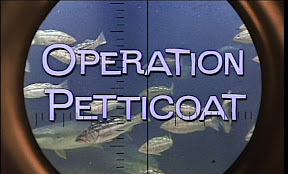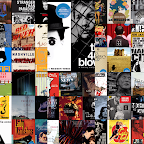8/26/2014
Blu-ray Review: Operation Petticoat (1959)
Under the tutelage of his frequent cinematic collaborator and early mentor, the talented director Richard Quine, Blake Edwards penned the original and adapted scripts for a string of successful service comedy studio pictures from Sound Off to the On the Town inspired All Ashore.
Rounding out the series of 1950s-based WWII nostalgia driven films by co-writing the Jack Lemmon vehicle Operation Mad Ball, Edwards cemented a relationship with the star that would ultimately pay off in his greatest early achievement via the dramatic Days of Wine and Roses years later when he became an acclaimed genre and rule-breaking filmmaker in his own right.
After ten plus years of writing jokes and helming B-movies, Edwards had proven his track record with the then-trendy genre that played into the Greatest Generation’s experiences and sacrifices in the second world war now that the veterans had begun growing restless in the suburbs. Given the chance to move up the ladder in the same terrain, Edwards closed out the decade with a cinematic coup by taking advantage of the opportunity to climb it several rungs up to go straight to the top.
Earning his dues by trying to be the funniest, friendliest and/or fastest one in the room, Edwards was tapped to direct a big-budgeted WWII submarine-based servicemen sex comedy with a star-studded cast of marquee names playing larger-than-life characters.
Two years before he talked Audrey Hepburn into taking on an against-type role in Breakfast at Tiffany’s (which has since become synonymous with the star who rose to icon status with the film) and four years before he kicked off another picture-perfect collaboration with Peter Sellers in The Pink Panther franchise that illustrated his ease with physical pratfall based comedy, Blake Edwards took Petticoat to sea.
Embracing the challenge of blending high and lowbrow humor in the film’s shameless hybrid of sophisticated wordplay with silly slapstick and sight-gags, you see in Petticoat a filmmaker at play, practicing and getting better with a new prop, line-read, or ensemble approach here or there.
While like a few of his other earlier works, the results are uneven, Petticoat is one of his strongest precursors to Panther.
Whether scenes are filled with conman swagger or comedic klutziness, you can sense his filmic thought process being tested onscreen so that by the time he crossed paths with Sellers, it only took them one test-run (by way of the first, oh-so-slow Panther) to realize that chaotic rhythm – something fast-paced and with a beat you can laugh to – makes everything wittier.
And it’s this frantically fast and furiously funny approach that both professionals illustrated again and again both together (in The Party as well as the Panther series) and apart (in The Great Race for Edwards and Dr. Strangelove for Sellers).
Petticoat’s long-overdue arrival on this Blu-ray presentation from Olive Films offers the ideal opportunity for cinephiles to get a second chance at their first impression of Edwards which is too often linked with the absurd antics of Sellers in Panther, Dudley Moore in 10 or sadly, the misguided racist caricature of Mickey Rooney contrast with the loveliness of Hepburn in Tiffany’s.
Despite its contrivances and formulaic service comedy structure that couldn’t hold a candle to the then-recent Mister Roberts, upon revisiting Petticoat today you find an energetic, ambitious – if overlong old-fashioned ensemble comedy that highlights all roles from walk-ons to leads.
From the wild guests at The Party to all those taking part in The Great Race, Edwards is – like most writers – fascinated by people and the generosity with which he creates something scenes out of nothing parts is a breath of fresh air to the cardboard cutouts walking around in today's titles.
And while one can only imagine how stressful it’d be to direct cast members of the stature of Cary Grant – much like he did with Richard Quine and Jack Lemmon – Edwards reunited with Grant’s co-star Tony Curtis later on in a career where not only did he seem to play well with others collaboratively by working together to bring out the best in all but also by building on his background as a writer in understanding that the film begins on the page.
The result is a brilliantly written dialogue-heavy comedy with a peach of a part as a fast-talking operator (in the vein of Sgt. Bilko or Axel Foley) for Curtis whose multiple page per minute delivery helps punctuate the Oscar nominated script from Pillow Talk scribes Stanley Shapiro and Maurice Richlin.
While one shortcoming of the new high definition transfer is the shoddy sound and lack of subtitles to make sure every word lands, it's nonetheless a multilayered work that's pulsing with life. Lensed with care and attention, the cinematography by legendary Howard Hawks cameraman Russell Harlan (Red River, Rio Bravo) ensures we feel every bit of sexual tension and every close call aboard the perpetually doomed U.S.S. Sea Tiger that Cary Grant’s career officer is determined to save from the scrap heap and get back in fighting shape.
Pushing his hardwired military mandated morals and regulations aside, Grant opts to look the other way and let Curtis’s conman steal any available part that isn’t nailed down as the new supply registration officer with a habit of smuggling anything from people to toilet paper aboard the sub.
After a group of stranded female servicewomen are forced to stow away on a ship filled with men quickly driven to distraction – including Grant who fails to keep things professional after ill-timed flirting forces him to torpedo a truck instead of taking out the enemy who’s just discovered their position – understandably, it’s getting things off the vessel that proves to be Grant’s biggest problem.
Soon realizing that they’ll need to band together to get out of the war alive and keep the ship afloat – both of which are tested when a primer problem results in a bright pink submarine – the crackling chemistry and camaraderie helps buoy Edwards’s Operation whenever it begins to stay off course. Amazingly deriving some of its most memorable characters and craziest anecdotes from real life battle stories – Petticoat manages to hit mostly untroubled waters for a majority of its overly long running time.
Hilarious as the conman template for the talk-his-way-out-of-anything archetype later embodied by Eddie Murphy in Beverly Hills Cop, Tony Curtis (whose daughter Jamie Leigh was cast in what would’ve been essentially the love interest to his ‘59 part in the short-lived late ‘70s TV spin-off) nails his jokes although his character’s skirt-chasing antics seem about a overdone as the actor’s rather conspicuous eye makeup.
One of the highest grossing titles for the year, Operation Petticoat was also said to be one of the biggest regrets of Bob Hope’s professional life after he turned down a role in the film he later admired.
While the subpar sound quality and muddied color specs of the release pales in comparison to some of Olive’s previous titles (in Blu-ray or DVD) and make me wonder whether or not it was even restored before the 1080p upgrade, the film is still an entertaining men-in-uniform romp with a bit of war action and sex comedy mixed in for good and bad measure.
For admittedly the changes in tone work about as well as the extended flashback device does to bookend the uneasy blend of nostalgia and the ridiculousness that arises in this nonetheless enjoyable tribute to problem solving on a large scale.
However from a film studies standpoint, Petticoat can also be appreciated as a tribute to early Edwards (and therefore his mentor Quine) in not only foreshadowing later work but also showing you his movie-making method of madness.
Namely, as evidenced onscreen, it starts by surrounding yourself with a loyal, talented crew. Then by working in the fact-based offscreen elements, Edwards also uses everything at his disposal from a memo about toilet paper to the unexpected patriotism of a brassiere to make you laugh so hard that – like a magician using comedy instead of a wand as a misdirect – you don’t notice the trick that he’s actually making you think as well.
And now that we've just begun to digest his transition from writer to director, what we really need is a box set release of his ‘50s service comedies to reacquaint film lovers with the start of a brilliantly funny career due to his collaboration – before Moore, Sellers, Hepburn or Lemmon – with the underrated Richard Quine.
Text ©2014, Film Intuition, LLC; All Rights Reserved. http://www.filmintuition.com Unauthorized Reproduction or Publication Elsewhere is Strictly Prohibited and in violation of the Digital Millennium Copyright Act. FTC Disclosure: Per standard professional practice, I may have received a review copy of this title in order to evaluate it for my readers, which had no impact whatsoever on whether or not it received a favorable or unfavorable critique.




















